HUC: A Hemispheric Alliance for Innovation and Sustainability
15 October 2024
The Hemispheric University Consortium (HUC), chaired by UC Chile, unites fourteen universities across the Americas with a shared commitment to the United Nations' Sustainable Development Goals (SDGs). This alliance fosters innovation through initiatives like virtual internships, social ideas competitions, and a platform for resource-sharing and enhanced research on biodiversity, inclusion, and educational innovation.
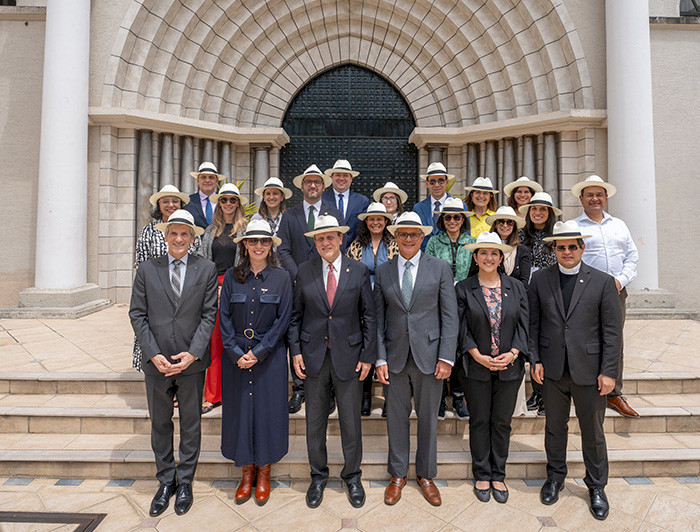
photo_camera Institutions from Canada, the United States, Mexico, the Dominican Republic, Costa Rica, Colombia, Ecuador, Brazil, Peru, Argentina, and Chile participate in the network. (Photo credit: USFQ)
Representatives from the Hemispheric University Consortiym's (HUC) fourteen member universities recently gathered in Ecuador at Universidad San Francisco de Quito for the consortium's general assembly. Established in 2018, HUC aims to promote collaboration in higher education and advance the United Nations's Sustainable Development Goals (SDGs).
The network includes institutions from Canada, the United States, Mexico, the Dominican Republic, Costa Rica, Colombia, Ecuador, Brazil, Peru, Argentina, and Chile. HUC's working groups have focused on social entrepreneurship, global learning experiences, research, communications, library resources, and more.
As UC Chile President Ignacio Sánchez, who has chaired HUC since November 2023, stated, "It is invaluable for our institution to lead this consortium, which unites universities from across the Americas. Together, we address urgent challenges facing our societies, including public health, climate change, sustainability, teaching innovation, entrepreneurship, and technology."
He added, "This assembly in Quito allowed us to review progress in various working groups, thanks to the collaboration and trust built among members. We aim to strengthen research, maintain teaching partnerships, and expand student and faculty mobility initiatives."
Julián Rodríguez, President of Universidad Austral de Argentina and Vice President of HUC, remarked, "The HUC Annual Meeting strengthened ties among member universities. We all agree on the importance of joint research on biodiversity, inclusion, and educational innovation. This productive meeting inspires hope for HUC's present and future."
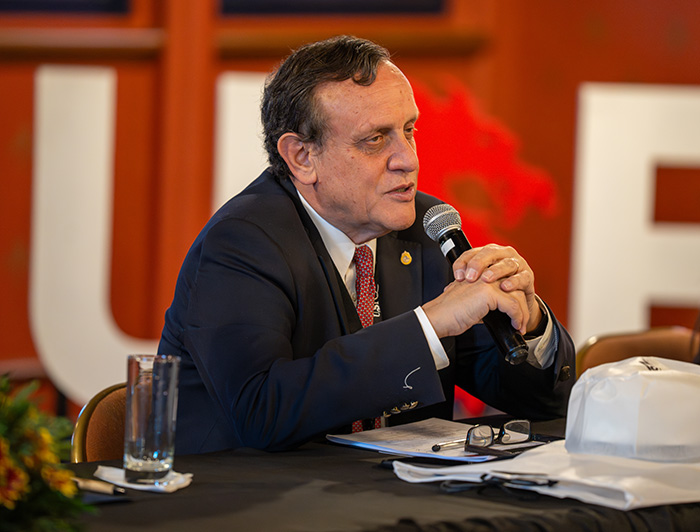
Pioneering Initiatives: From Virtual Internships to Social Challenges
HUC's main objectives focus on public health and well-being, climate change and sustainability, inclusive entrepreneurship and innovation, information sharing, and teaching innovation.
In response to the COVID-19 pandemic, HUC facilitated an exchange of best practices, mitigating the impact of the health crisis. During this time, virtual learning collaborations and student research internships were initiated. This ongoing internship program connects HUC faculty with students from member institutions, enabling collaborative research and scientific exchange.
Professor Loreto Cox from UC Chile's School of Government shared her positive experience: "I worked with an extraordinary student, Hernán Carvajal. My co-author and I even hired him to continue working with us, and he is now a co-author on a paper."
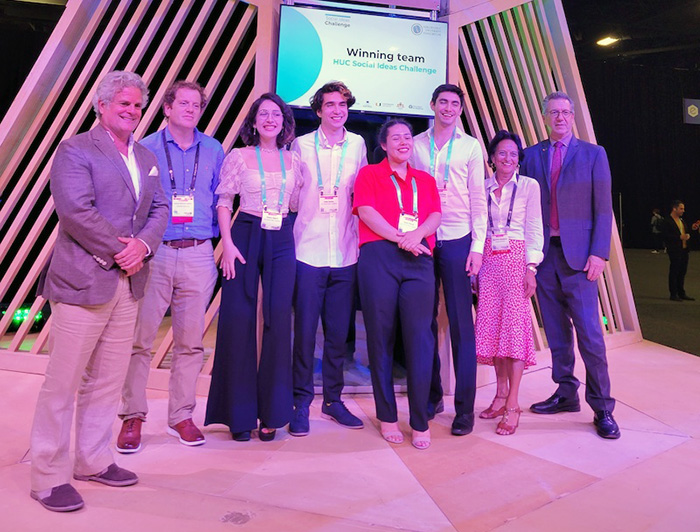
Another major initiative is the HUC Social Ideas Challenge, an annual competition in which students propose solutions to social challenges. The winners compete in a final event at eMerge Americas in Miami.
In 2022, UC Chile students won with their Re-Flush project, a graywater filtration device. The most recent winner, TEAcompaño from Universidad San Francisco de Quito, supports education for children on the autism spectrum.
As Constance Fleet, Associate Director of Research and Innovation at UC Chile's School of Engineering, explained, "The Social Ideas Challenge includes workshops on pitching and impact measurement. It's a space for participants from diverse countries to share insights and gain new perspectives."
Other notable initiatives include dialogues held around the SDGs and collaboration with the WISE program, aimed at women entrepreneurs in STEM fields.
Building Knowledge Together: HUC's Digital Platform for Resource Sharing
The HUC Libraries team has developed an online platform for sharing informational resources and academic articles among members.
Focused on the Sustainable Development Goals (SDGs), the team organizes webinars to share best practices and projects, increasing the visibility of open-access institutional repositories.
"Since 2021, we've hosted 13 webinars with over 5,000 attendees from 19 countries," noted Evelyn Didier, Director of UC Chile Libraries.
She adds, "It's a network that enables us to share knowledge, experiences, and best practices in a highly dynamic digital environment. Through an online platform, we can exchange tools and informational resources and promote HUC's collaborative research on the five key global challenges defined by the Consortium."
Charting the Path Forward: HUC's Vision for Future Collaborations
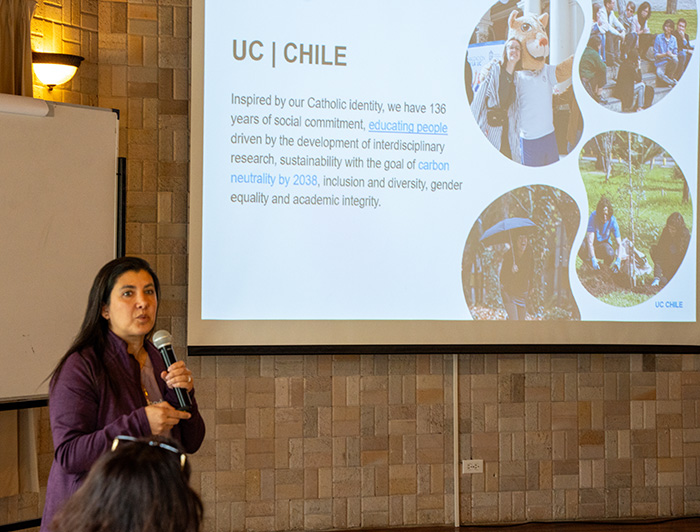
As UC Chile Vice President for International Affairs Lilian Ferrer stated, "HUC will continue to strengthen collaborative efforts in global education, social entrepreneurship, and innovation. Our library network will support sustainable research, fostering collaboration and generating synergies that promote progress and innovation."
Research is a crucial focus of HUC, with a new working group dedicated to enhancing collaboration among member universities. UC Chile Vice President for Research Pedro Bouchon remarked, "HUC has great potential, with member universities keen to boost research efforts. Virtual internships enable students to tackle research challenges proposed by partner universities. Soon, a seed fund competition will support academic and student mobility, laying the foundation for large-scale funding opportunities."
Andrea Encalada, Vice President of Universidad San Francisco de Quito, emphasized the role of HUC universities as leaders in research and internationalization: "The annual assembly is an opportunity to share best practices, knowledge, and growth, strengthening our institutions and addressing the needs of the Global South."
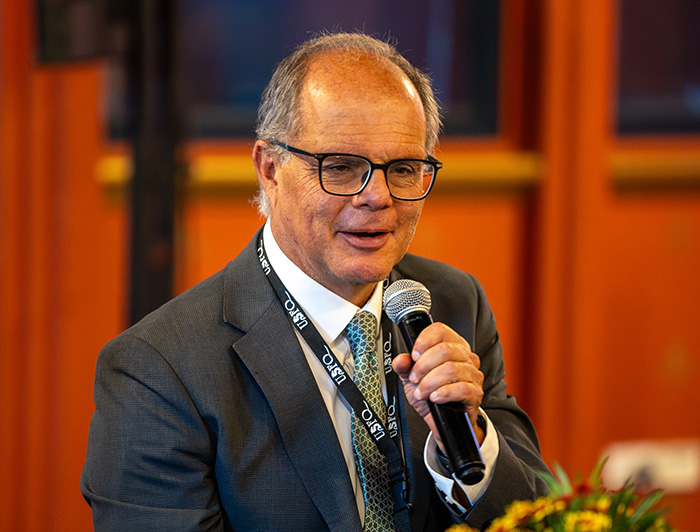
The meeting’s conclusions highlighted the strengths of student entrepreneurship initiatives and the work being coordinated by the research group. Also emphasized were the personal connections formed among members, fostering bonds of friendship, trust, and shared goals.
Ana María Sepúlveda, Executive Director of UC Chile's Vice Presidency for International Affairs, highlighted the consortium's value: "We've developed relational capital as a consortium, which is invaluable for HUC's future. This trust-based environment enables us to advance teaching, research, and institutional development."
Father Secilio Espinal, President of Pontificia Universidad Católica Madre y Maestra in the Dominican Republic, reflected on HUC's collaborative spirit: "Our synergy drives transparent, impactful work. Together, we envision a higher education system founded on quality, inclusion, and relevance, with a focus on future common projects."
In conclusion, Diego Quiroga, President of Universidad San Francisco de Quito, remarked, "I believe the conference was a success, addressing highly relevant topics for the entire region. We’re exploring issues of shared concern that also align with our strengths. Through these strengths, we are building a consortium that will endure over time, leading in each country with ideas and solutions that respond to the needs of our societies."




